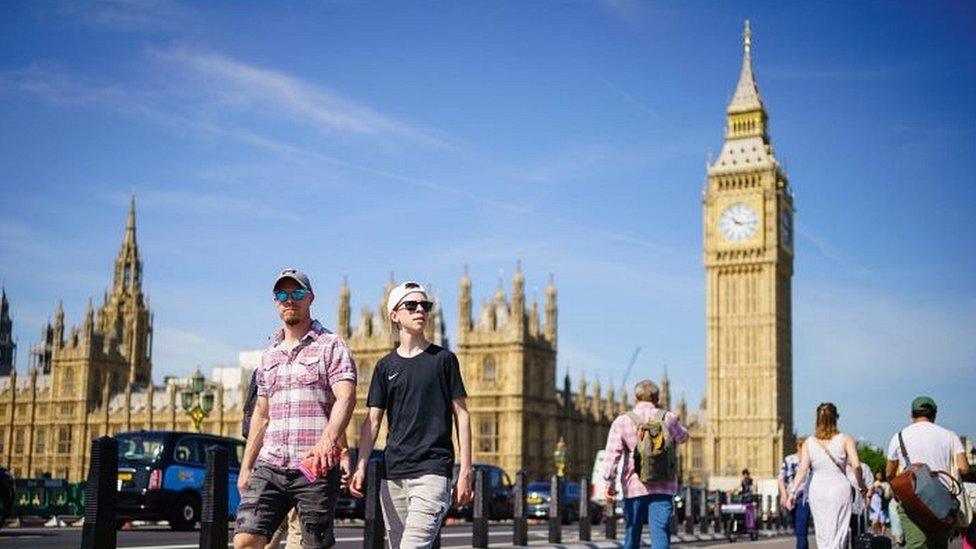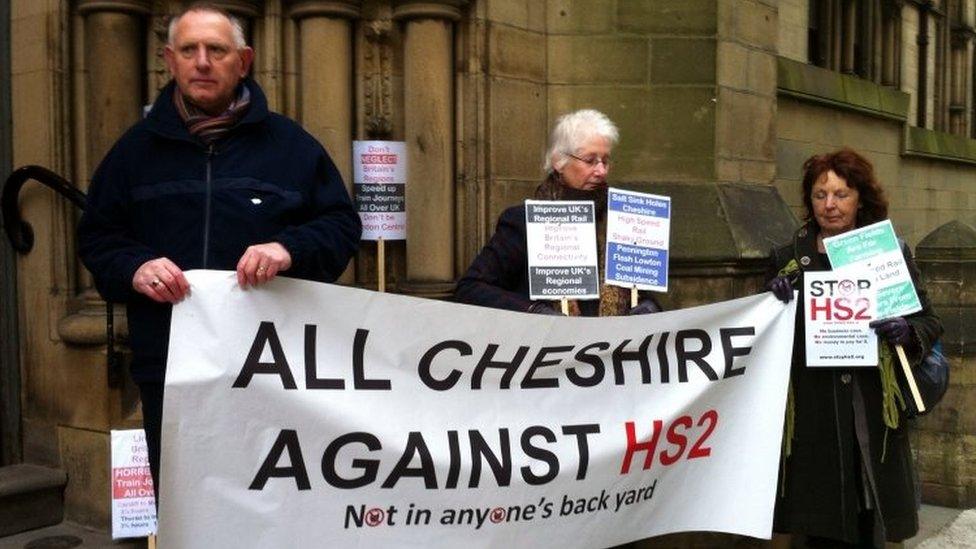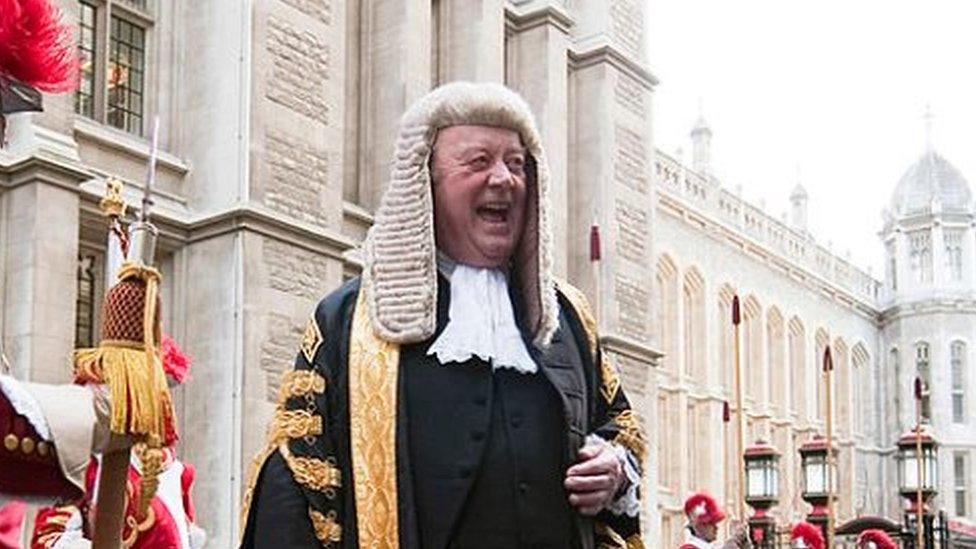What's happening in Parliament this week?
- Published

Is there such a thing as frenetic calm?
Somehow Westminster is managing to combine an agenda of routine law-making and scrutinising with an undercurrent of feverish plotting and speculation. It spills over occasionally into bad-tempered exchanges and outbursts in the Commons chamber.
Essentially parliamentarians are waiting for the next act in the continuing drama around the prime minister.
Behind the scenes some hardcore legislating is going on, with committees of MPs beavering away at the detail of important measures like the Online Safety Bill and the Public Order Bill, external. The latter is due to complete its committee stages on Tuesday - teeing up what will be an interesting and hard-fought report stage back in the chamber, followed by an even harder-fought passage through the Lords.
Monday sees the home secretary taking questions, and there will doubtless be the usual crop of post-weekend government statements and urgent questions.
The main legislative action is the second reading debate for the bill to authorise the next stage of HS2, the High Speed Rail (Crewe-Manchester) Bill. As a bill affecting private interests (it authorises the compulsory purchase of land along the route). it triggers an exhaustive committee process, including visits to communities affected.

Protesters against HS2 outside Manchester Town Hall
So expect to hear from local MPs, but also from others who see scrapping the scheme as a way to free up vast sums of public money for what they view as more productive uses.
On Tuesday, the main debate (probably two debates in fact) will be on a Labour Opposition Day motion or motions - the subjects are normally announced on Monday.
Wednesday sees the Commons open with Northern Ireland questions and PMQs (where it seems to me that both main protagonists, the PM and the Leader of the Opposition are now under heavy scrutiny from their troops) - and then MPs whiz through all stages of consideration of the Social Security (Additional Payments) Bill.
This provides for means-tested additional payments and a disability additional payment. The first is £650, paid in two instalments, to those receiving a qualifying means-tested benefit. The disability additional payment is £150.
On Thursday, MPs will have a chance to raise the latest twist in the long saga of the restoration and renewal of Parliament's Victorian home at question time. The House of Commons and House of Lords Commissions (the chambers' administrative arms) have decided to abolish the Parliamentary Works Sponsor Body, the client organisation created to represent the interests of parliamentarians in the multi-billion pound revamp.
So look out for some cross-questioning of the MP who speaks on behalf of it in the chamber, as they're asked to explain what's gone wrong with the system set up in 2019 and the reasons for scrapping it, and quite possibly how long it will take before a new strategy for the vast project is devised and accepted, let alone implemented.
The main debates are on two subjects chosen by backbench business committee - investing in promising new treatments for Motor Neurone Disease, and a national food strategy and food security.
In the Lords, peers continue their preliminary slog through the detail of the Schools Bill, with the final two days of committee stage debates on Monday and Wednesday. Remember these debates are used to identify issues and hone precise amendments for debate at the ensuing report stage, so it's extremely rare for any votes to be held at this stage.
But the Education Minister Baroness Barran has promised peers that concerns they have raised - including around the sweeping powers the bill grants to ministers - will be addressed in new amendments to be introduced by the government. There's also talk of a Lib Dem amendment to add black history to the national curriculum.
Abortion rights in Northern Ireland
Tuesday sees peers debate the Abortion (Northern Ireland) Regulations 2022, which in the continued absence of the Northern Ireland Assembly implements the legalisation of abortion.
Previous regulations in 2020 established a framework for lawful abortions in Northern Ireland, but trusted the implementation to the Northern Ireland Department of Health. However, abortion services have yet to be commissioned or funded.
On Thursday, there are a couple of interesting-looking debates on subjects chosen by two crossbench (independent) peers. The first, led by the former wastefinder-general, Lord Morse, also a former head of the National Audit Office, is on the impact on democratic processes of any lowering of standards of behaviour and honesty in political life.
And then Lord Lisvane, the former Clerk of the Commons, has a debate on the stresses on the Union of the United Kingdom. He is one of the leading lights of Lord Salisbury's Constitutional Reform Group, which produced a design for a devolved UK in the Act of Union Bill, floated during the previous Parliament.
He will use the occasion to highlight the centrifugal forces making it harder to maintain the Union, and to point to the dangers of "imperial condescension" by central government towards the devolved administrations.
With pressure growing for a second independence referendum, Scottish Secretary Alister Jack is before the Scottish Affairs Committee on Monday, with the SNP's Pete Wishart in the chair and the Scottish Conservative leader Douglas Ross among those asking questions. Other topics could include the cost of living, lessons from Storm Arwen, and the impact of EU import controls.
Elsewhere on the Committee corridor, Northern Ireland has a session on the government's new proposals for dealing with the legacy of Northern Ireland's past (Tuesday). Key players giving evidence will include Jon Boutcher, who led Operation Kenova, the highly-regarded investigation into the activities of 'Agent Stakeknife', a British Army spy alleged to have been involved in IRA kidnapping, torture and murder.
Also appearing will be Northern Ireland's Deputy Chief Constable Mark Hamilton and Justice Minister Naomi Long.
Environment, Food and Rural Affairs (Tuesday) continues its inquiry into rural mental health with panels of witnesses talking about suicide prevention, and also how the NHS plans and delivers mental health services for rural communities.
Women and Equalities (Wednesday) hears from Home Office Safeguarding Minister Rachel Maclean and Digital Economy Minister Chris Philp in the final session of its inquiry into pornography and its impact on violence against women and girls.

Lord Chancellor Ken Clarke in 2011
Look out for the Lords Constitution Committee's inquiry (Wednesday) into the role of the Lord Chancellor and the law officers, featuring a stellar cast of former Lord Chancellors (I'm trying to devise a good collective noun - "a lamentation"?) including David Gauke (2018-19), Lord Clarke of Nottingham aka Ken Clarke (2010-12) and Jack Straw (2007-10).
I daresay the subject of the European Court of Human Rights might come up.
Public Accounts (Wednesday) recalls Ministry of Defence Permanent Secretary David Williams, following a series of reports which have been increasingly critical of the delivery of major defence projects.
